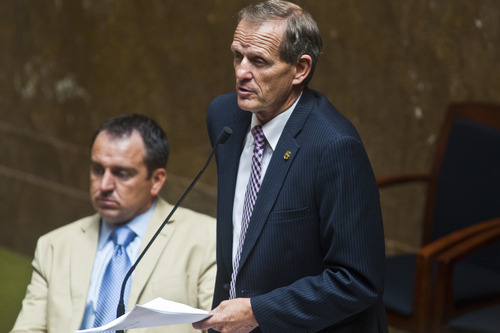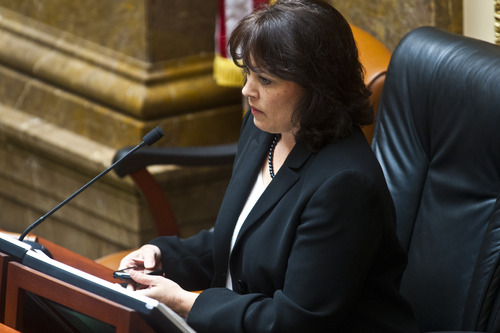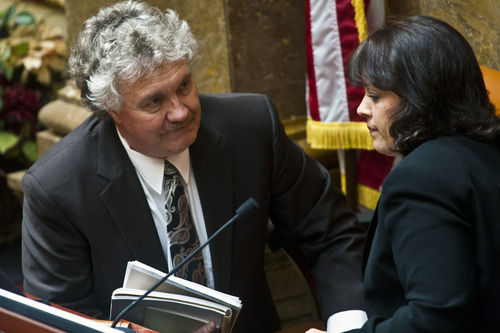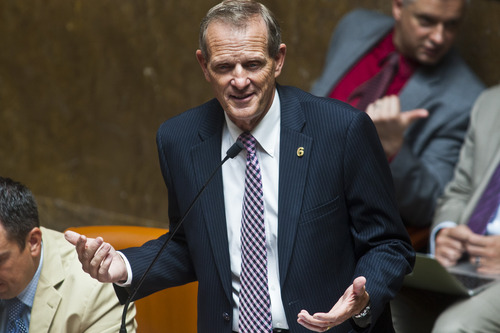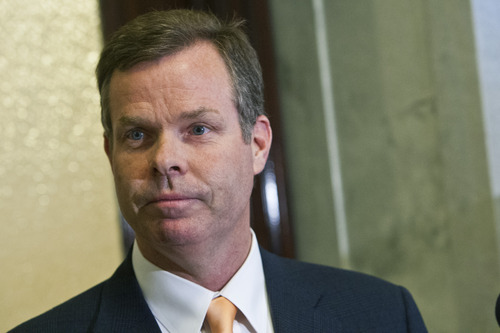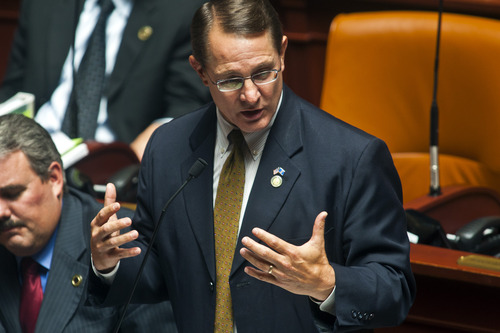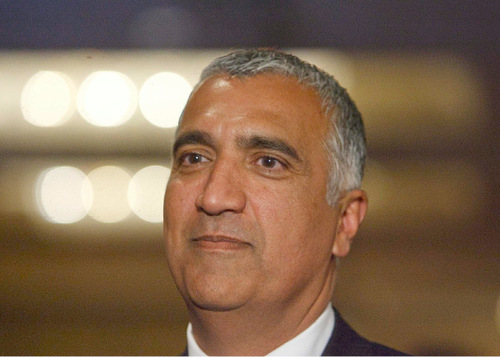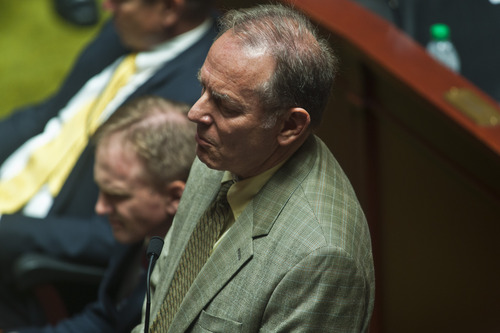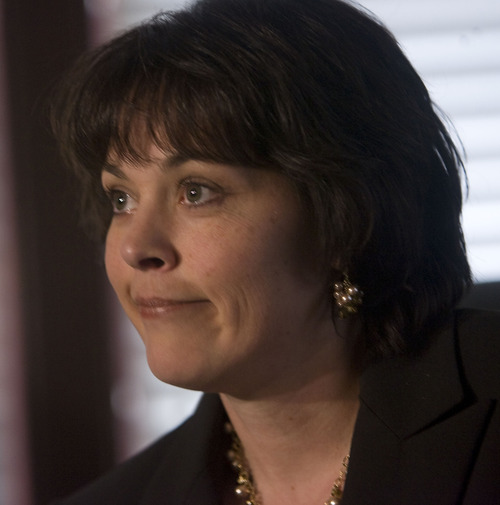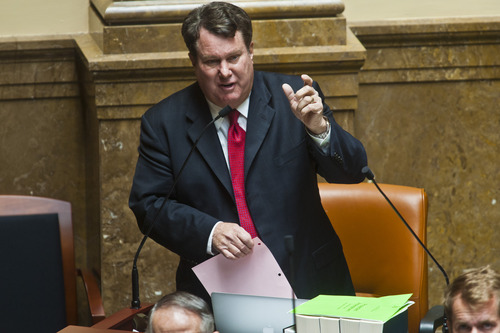This is an archived article that was published on sltrib.com in 2013, and information in the article may be outdated. It is provided only for personal research purposes and may not be reprinted.
Members of a House investigative committee will engage in a high-wire act, of sorts, as they probe allegations of misconduct by Attorney General John Swallow.
The panel, to which House Speaker Becky Lockhart is expected to appoint members Wednesday, will have to balance its own pursuit of information with an awareness of ongoing criminal investigations as it decides what matters it can air publicly without impeding the other probes.
"It's incredibly unusual and very difficult," said Kirk Jowers, director of the University of Utah's Hinckley Institute of Politics. "It brings up the perfect conundrum, because you have an investigation done expressly for the public trust, but it sits in contrast with all of these private investigations which are in the name of justice … and sometimes they aren't completely compatible."
In a letter to legislative leaders Monday, Swallow's attorneys — Rod Snow, Neil Kaplan and Jennifer James — asked the investigative committee for the ability to subpoena witnesses on Swallow's behalf and to be present when witnesses are interviewed.
They also once again argue that the House committee is exceeding its constitutional bounds, insisting the probe should be limited to Swallow's actions since taking office in January.
Going beyond that limit, the attorneys argue, opens the door to the Legislature trying to override elections, violating the separation of powers doctrine, and potentially running afoul of the federal Civil Rights Act.
"Sparing the expense, trauma and time attendant to such an investigation seems to make sense, under these circumstances," Swallow's lawyers wrote.
The House becomes the fifth entity to investigate Swallow, following in the path of federal investigators, a pair of county attorneys looking at whether state laws were violated, a special counsel expected to be named Wednesday by the lieutenant governor and dual complaints before the Utah State Bar.
And while there are similarities and inevitable overlap, the mission of the various lines of investigation are very different.
"All of us have different responsibilities, and I think the House is taking its responsibility very seriously. But its function — and investigation for information-gathering it's doing — is going to be clearly different from what we're doing," said Salt Lake County District Attorney Sim Gill, one of the two county prosecutors looking at activities in the Utah attorney general's office.
Gill said care will have to be taken to avoid potential friction among the various probes, but he hopes the parties will communicate and work out differences. "The goal here is to be very careful, very deliberative and also very protective of all parties equally."
Lockhart said Tuesday that she, too, hopes the House committee can communicate and work through potential differences with other investigators.
"We hope we'll have some cooperation, if you will, that we'll share information," said the Provo Republican. "Those are really things we'll leave up to the committee."
Potentially complicating the calculus is the fact that the House inquiry — in an effort to win the public trust — is expected to unfold largely in the public spotlight, heightening the potential for conflicts with the behind-the-scenes investigations.
The Legislature plans to take steps Wednesday to alleviate some of those concerns, passing a series of exceptions to the state's open-meetings and records laws that would allow portions of the House investigation to be conducted behind closed doors.
Jeff Hunt, an attorney representing the Utah Media Coalition, said legislative leaders initially wanted much more sweeping authority for the committeeto do its work in private. The exceptions were narrowed during negotiations to a point where he said he believes the product is appropriate.
Law enforcement investigations, he noted, are not done publicly, but they have a different mission than the legislative inquiry.
"This is a unique animal," he said. "We felt very strongly that the work of the committee should beas open and transparent as possible, but at the same time we recognized, because of the unique nature of this committee and its mission, there needed to be some protections for the investigative process to properly function.
"You want them to have the tools and processes in place to have a legitimate and effective investigation. If they're not going to do that, then what's the purpose?"
Lockhart said she envisions the committee holding private meetings in rare circumstances.
"We want to make this as public and open as absolutely possible, but we don't want to put people in danger and we don't want to put other criminal investigations in jeopardy," she said. "I think the public will understand that."
Lockhart said she discussed the makeup of the committee with House leaders Tuesday, but noted those who were going to serve on it still haven't been notified. She once again declined to say what the partisan makeup of the nine-member panel would be.
Democrats had argued in favor of changing the committee to an eight-member panel with an equal Republican-Democrat split, but were voted down. Now they say a five-to-four Republican edge is the most reasonable path forward.
Senate President Wayne Niederhauser said he expects the Senate will support the statutory changes to help the House investigation, believing lawmakers need information "with substance" to move forward.
"We obviously would have liked them to choose to do this in an impeachment process, if they were going to do it," the Sandy Republican said. "There was some question of whether they should do it. We would have preferred they do that, then we wouldn't have to change any statutes. But since that was politically untenable for the House and understanding the situation they were in, we are very supportive."
Twitter: @RobertGehrke —
Another big day on the Hill
The Legislature is scheduled to meet in a special session Wednesday at 12:30 p.m. to clarify the powers of the House's special committee investigating Attorney General John Swallow.
Lawmakers also are expected to empower the panel to close some hearings and seal some records until its probe is complete.
The House inquiry could take months, cost taxpayers several million dollars and lay the groundwork for impeaching the state's top cop.
Follow Wednesday's developments from Utah's Capitol Hill at sltrib.com


